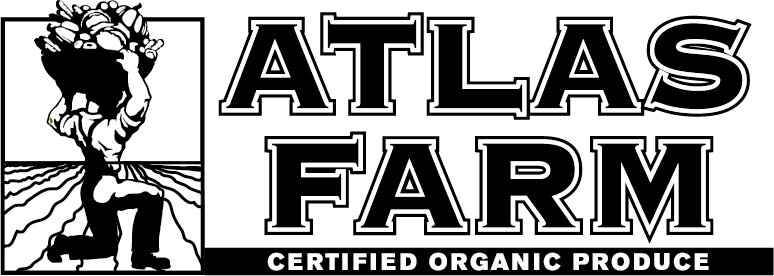Our Commitment to Sustainable Practices
From its earliest beginnings, Atlas Farm has been committed to sustainable practices. Certified organic and selling to local and regional markets, our small farm has a head start on conventional, industrial-scale agriculture in many regards. Organic practices protect our farm workers, customers, and ecosystem from toxic pesticides and herbicides, and compel us to focus on soil health. We fertilize our fields with cover crops and organic, naturally-occurring soil amendments. Insects and diseases are managed through crop rotation, biological controls, and cultivar selection, with organic pest controls used only as a last resort.
Our commitment to local and regional markets reduces transportation costs and carbon footprint, as well as giving rise to countless harder-to-measure benefits — a more vibrant and resilient local food system, personalized relationships with customers, increased community access to nutritious food, and the ability to prioritize flavor and freshness in our crops.
As an evolving business, Atlas celebrates these “wins” while recognizing the need for continuous innovation and improvement to our farm systems. In particular, the challenges presented by climate change will only increase in coming years. We are committed to mitigating our contributions to climate change, and building resilience in the face of its inevitable effects, through investment in sustainable energy sources and soil-based carbon sequestration.
Sustainable Energy
Energy use is one of the greatest challenges facing agriculture and the world at large. Our long-term goal is to become a 100% bio- and solar-powered farm. In 2012, we installed a 24kw photovoltaic system at the main farm that meets three-quarters of this location’s electrical needs. In 2018, we completed an additional 65kw system that meets the full electrical needs of the Atlas Farm Store and adjacent greenhouses. These solar energy projects offset approximately 70 tons of carbon emissions per year.
In 2024, we added an 85kw photovoltaic system to our on-farm cold storage building. In addition to providing supplemental power to the farms’s main greenhouse, we envision this system supporting future charging stations for electric vehicles and tractors.
Our solar PV projects are complemented by an on-farm biomass system which provides heat for the main farm’s greenhouse, packinghouse, office, and labor housing. This system, completed in 2020, burns wood chips from local, sustainable sources, replacing over 20,000 gallons of propane each year and offsetting around 200 tons of carbon annually.
Harnessing the Power of the Sun
Our long-term goal is to power 100% of our farm operation with sustainable biomass and solar.
Waste Reduction
Atlas Farm is committed to reducing food waste. We are proud to partner with the Food Bank of Western Massachusetts, to which we donate over 100,000 pounds of fresh produce each season. Most of these donated vegetables are seconds, which cannot be sold due to small size, irregular shape, or cosmetic blemishes — but are still delicious and nutritious. In addition to these Food Bank donations, many of our seconds tomatoes find new life as organic tomato purée (available at the Atlas Farm Store and other local stores).
Unfortunate but unavoidable: The more produce we sell to wholesale customers, the more produce packaging we use. Wax boxes are the standard packaging for most fresh produce; everything from cabbage to zucchini is delivered in these single-use, non-recyclable boxes. In an ongoing effort to divert boxes from the waste stream, we pack orders for many of our regular customers in sturdy reusable totes. In 2022 “tote customers” helped us save over 5,100 wax boxes from landfills.
Bringing in the Harvest — in Sustainable Totes!
Atlas Farm’s sturdy re-usable totes save over 5,100 non-recyclable wax boxes per season.
Reduced Tillage
Since 2022, Atlas Farm has been working in collaboration with the American Farmland Trust to research and trial minimum-till production methods for organic crops such as kale, winter squash, and tomatoes. Reduced tillage has numerous important benefits, including minimizing labor, fuel, and fertilizer use, building soil health and mitigating erosion, and reducing the climate impacts of agriculture by sequestering carbon in the soil.
2024 was our second year as one of eight farms participating in the “Farmer Led Innovations” grant program. This program has enabled us to devote additional acreage to minimum-till experiments — planting into mulch created with successive cover crops of oats, peas, and buckwheat; planting into mowed winter rye and hairy vetch cover crop; strip tillage in living Dutch white clover; and establishing living mulches in pathways between black plastic planting beds.
In addition to improving soil health and boosting carbon sequestration by minimizing soil disturbance, reduced tillage minimizes tractor use. By incorporating these methods more fully into our crop systems in seasons to come, we estimate a reduction of up to 40% of our tractor hours — saving approximately 2,700 gallons of diesel fuel per growing season.
Building Soil Health with Cover Crops
In minimum-till systems, cover crops are used to build up a layer of mulch on the soil’s surface — while their roots sequester carbon below ground.



